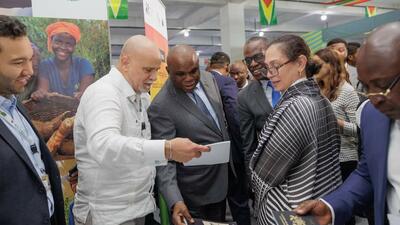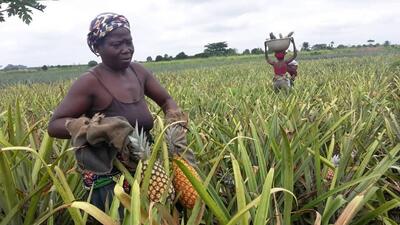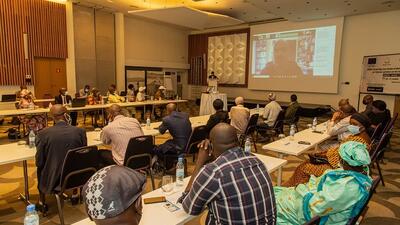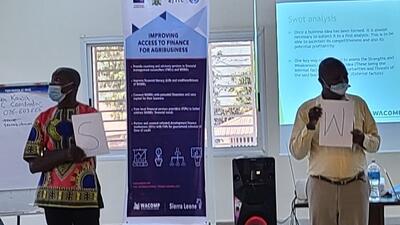

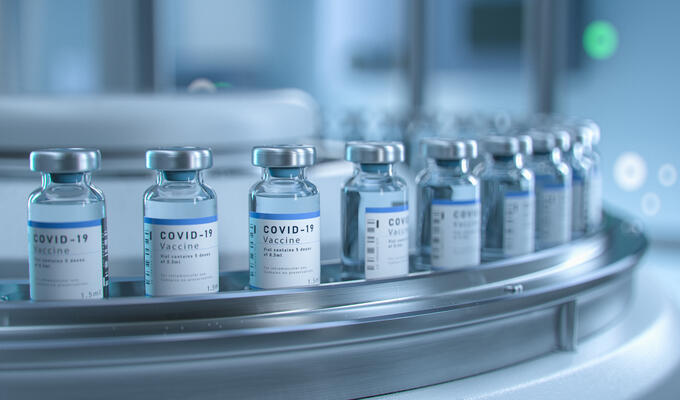
How Africa is moving to make its own vaccines
The African Union wants to the continent to make 60% of its vaccines by 2040. It’s an ambitious target – up from less than 1% – but one that the region is taking concrete steps to achieve.
During the pandemic, Africa was among the last regions to receive vaccines. To prevent that from happening again, the region has created new systems to beef up Africa’s vaccine security and to prepare for future pandemics.
At the Eighth Tokyo International Conference on African Development in August 2022, the International Trade Centre brought together leading practitioners in Tunisia to outline the next steps toward reaching the local production goal.
New actions taken to harmonize regulations, establish free trade, and coordinate vaccine purchases “will reshape the market for vaccines, vaccine inputs and vaccine research,” said Charles Lor, ITC programme manager for vaccines.
Collective action in a regional bloc
The Partnership for African Vaccine Manufacturing hosted by the Africa Centres for Disease Control has set out a coordination plan to avoid duplication, unnecessary competition and oversupply.
The Economic Community of West African States (ECOWAS), whose 15 members account for one third of African vaccine demand, has set up a task force to strategize on how national schemes to produce vaccines can feed into regional and then continental plans.
West Africa already has a pharmaceutical industry, clearing the way for local vaccine production. The ECOWAS Taskforce has identified one one existing and four aspiring vaccine makers: Institut Pasteur de Dakar in Sénégal; Innovative Biotech and Biovaccines in Nigeria; and Pharmanova and the DEK Consortium in Ghana.
ECOWAS also identified 19 priority short, medium and long term vaccine markets ranging from yellow fever to cancer.
“Even though we are talking about three countries that can have capability to produce vaccines, we need to ensure that sister countries buy these vaccines so there is market demand to promote vaccine production,” said Sybil Ossei Agyeman Yeboah, a public health officer at the West Africa Health Organization.
Going forward, ECOWAS needs to pump money into its new Vaccines Revolving Fund while building a pooled procurement mechanism to give local manufacturers access to a large common market. The regional bloc also needs skilled pharmaceutical works, commercial skills, and private investment.
Growing a local biotech champion
Simon Agwale knows those challenges all too well. He founded Innovative Biotech in 2006, as the first privately-owned biotech company in Nigeria. He’s now seeking funding for its vaccine manufacturing plant.
“One of the key mistakes African companies make on the continent is… working in the sector without even looking at the business case,” Agwale said. “What are the gaps and how do we fill these gaps. That is one the first things we do.”
“We need to build an ecosystem that allows scientists to develop intellectual property,” he added.
Innovative Biotech must contend with national drug regulators, as well as the African Medicines Agency, the World Health Organization, and the US Food and Drug Administration.
The company also needs to license drug substances, find a manufacturing partner, a contractor to build the plant, and conduct clinical trials. Finally, it will need purchase agreements with global and regional buyers.
Innovative Biotech hopes to attract expatriate Africans once the facility is up and running.
“The entire manufacturing process is not rocket science,” Agwale said. “All we need is good pharmacists and laboratory technicians to train our staff. But we also need good supervisors.”
Investing in greenfield vaccine manufacturing
Across the continent, Algeria, Egypt, Ethiopia, Morocco, Senegal, South Africa, and Tunisia have the regulations and infrastructure to make vaccines, said Chishamiso Mawoyo, senior investment officer at the International Finance Corporation.
IFC, the World Bank’s private-sector agency, helps make local vaccines makers bankable. The agency is working with Institut Pasteur de Dakar, DEK Vaccines in Ghana, and the Rwanda Development Board to develop their vaccine projects. In South Africa, IFC has already invested in Aspen, which is Johnson & Johnson’s African partner for its COVID-19 vaccine.
Learning lessons in solving logistics challenges
George Wood, director of customer operations for sub-Saharan Africa with DHL, pointed to successes during the pandemic. He said DHL had delivered 22.5 million doses to 11 African countries.
“The vaccines should not stop moving,” Wood said.
When manufacturers know each country’s import requirements, they can prepare the documentation early. That allows the logistics provider to pre-clear the shipments.
“The vaccines are pre-cleared in air,” he said.
Different vaccines need different storage temperatures. So manufacturers need to understand logistics providers operate: how their cold chain works, what transit times they offer, and whether they can handle dry ice.
“Our Express (air) services offer a passive cold chain where the box maintains the temperature,” Wood said. “We use our speed to maintain the temperature”.
Air transport is challenging within Africa and reliant on passenger aircraft. That costs more, and comes with limited ability to handle dry ice.
After vaccines arrive, logistics firms need to deal with vast distances, security threats, and limited coolants or fridges. Two thirds of African countries do not have dry ice or gel packs availability locally.
Despite the challenges, the opportunities can be met through coordinated efforts around a clear roadmap that avoids the pitfalls that failed previous attempts at building a healthy vaccine industry in Africa.
About the project
The Vaccine Investments and Trade Ecosystems in Africa (VITEA) 2022-2023 is funded by the Ministry of Foreign Affairs of Japan. It supports the development of a vaccine sector roadmap in Nigeria and will provide advisory services on business operations and access to markets for vaccine R&D, vaccines and vaccine inputs.




